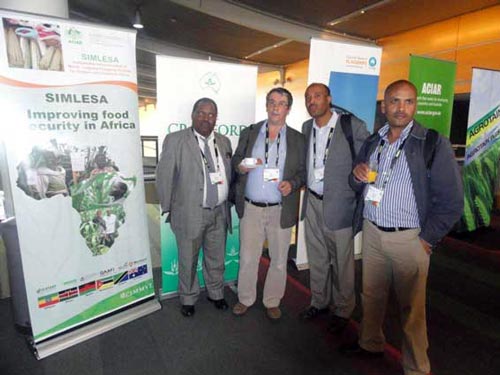“Agricultural research will remain pivotal to lifting agricultural productivity in the next 50 years as it has over the past 50 years.”
This was one of the key messages of Australia’s Foreign Affairs Minister Kevin Rudd in a plenary address closing the 5th World Congress on Conservation Agriculture, held in Brisbane, Australia during 26-29 September 2011. Rudd spoke in depth on the importance of agricultural research in ensuring global food security, recognizing the contributions of CIMMYT and other Consultative Group on International Agricultural Research (CGIAR) centers. “Food security requires that governments, global organizations, policymakers, scientists and farmers work in partnership to develop the best possible strategies to rise to this great global challenge of our time.”
The minister singled out the impressive achievements of the initiative on Sustainable Intensification of Maize-Legume Cropping Systems for Food Security in Eastern and Southern Africa (SIMLESA) since its launch in early 2010. “This particular project is helping to develop drought and disease-tolerant maize and legume varieties and to educate farmers about new farming technologies in conservation agriculture in five African countries. In the first eighteen months of the program, we’ve helped train more than 150 agricultural researchers from Malawi, Mozambique, Kenya, Ethiopia and Tanzania and trialed conservation agriculture in 215 fields owned by local farmers. It’s on track to reaching its target of increasing crop productivity of maize and legumes by 30% on around half a million African small farms within 10 years.”
 SIMLESA is funded by the Australian Center for International Agricultural Research (ACIAR), and led by CIMMYT. It is being implemented in collaboration with the national agricultural research systems of Ethiopia, Kenya, Malawi, Mozambique, and Tanzania; the International Crops Research Institute for the Semi-Arid Tropics (ICRISAT); and Australian partners including the Queensland Department of Employment, Economic Development and Innovation (QDEEDI), Murdoc University, and the University of Queensland. These partnerships with Australian universities, as well as with universities in Africa, have been key to building capacity through short-term training and postgraduate fellowships for researchers. Adopting the Innovation Platform framework, further co-operation with a range of private and public sector organizations, NGOs, and famers’ organizations in Africa has meant the project has been able to quickly and effectively reach farmers on the ground with outputs such as varieties and technologies.
SIMLESA is funded by the Australian Center for International Agricultural Research (ACIAR), and led by CIMMYT. It is being implemented in collaboration with the national agricultural research systems of Ethiopia, Kenya, Malawi, Mozambique, and Tanzania; the International Crops Research Institute for the Semi-Arid Tropics (ICRISAT); and Australian partners including the Queensland Department of Employment, Economic Development and Innovation (QDEEDI), Murdoc University, and the University of Queensland. These partnerships with Australian universities, as well as with universities in Africa, have been key to building capacity through short-term training and postgraduate fellowships for researchers. Adopting the Innovation Platform framework, further co-operation with a range of private and public sector organizations, NGOs, and famers’ organizations in Africa has meant the project has been able to quickly and effectively reach farmers on the ground with outputs such as varieties and technologies.
Rudd emphasized the value of investing in partnerships like these, particularly with respect to the growing field of conservation agriculture, the theme of the congress. “Conservation agriculture is one of the newest success stories in this quest to impart Australian knowledge to help feed the world,” he said. He reminded his listeners that Australia is both a world leader in agricultural research and a major international donor, mentioning the country’s role as a core supporter of the CGIAR.
Affirming Australia’s commitment to agricultural research and ending his address, he said “we need a new Agricultural Revolution of the 21st century if we are to feed a further 3 billion members of the human family. As a responsible global citizen, Australia stands ready to play our part.”
Complementing Rudd’s address at the congress, Mulugetta Mekuria, CIMMYT socio-economist and SIMLESA program coordinator, was interviewed by Australian media, including the Australian Broadcasting Corporation (ABC) and several radio stations, on SIMLESA’s potential role in contributing to enhanced food security in eastern and southern Africa. He acknowledged the role of partners in national agricultural research systems who are helping to implement activities in Ethiopia, Kenya, Malawi, Mozambique, and Tanzania; Australian institutions, regional and international partners for their technical backstopping; the support of the Australian government and ACIAR; and CIMMYT’s leadership of the program. “SIMLESA was designed to have impacts at both the household and regional level”, says Mekuria. “We want to increase food security and incomes while driving economic development through improved productivity from more resilient and sustainable farming systems. Project activities focus on integrated cropping systems, the use of innovation platforms to test and promote promising practices, and ensuring positive and measurable impacts.”

